Are you pondering how to love yourself more? Not all the time are we successful with what we are doing. Many times, we encounter difficult situations in our lives. We’re used to being hard on ourselves and thinking that we’re not doing enough or fast enough. However, knowing how to love yourself more is so important.
In this interview, Dr. Kristin Neff, author of the hit book Self-Compassion and extensive work in meditation, Buddhism, and mindfulness, discusses what self-compassion really is and how to love yourself more. She also shares tips on how we can integrate self-compassion into our daily lives.
She believes that self-compassion makes a huge difference. It helps us achieve our goals, become better relationship partners, and make the people we meet feel better. Learn how to love yourself more and change your life!
Table of Contents
Key Takeaways
- Self-compassion is being a good friend to yourself and learning how to love yourself more. It’s being supportive, kind, encouraging, and an inner ally rather than an inner enemy.
- Self-compassion means acknowledging that we are imperfect human beings doing the best we can and trying to be kind to ourselves in the process. Knowing how to love yourself more is so important.
- Starting the process of integrating more self-compassion into our daily lives:
- The first step in being more self-compassionate in daily life is noticing moments of suffering and struggle and trying to respond like a good friend to learn how to love yourself more.
- The most basic level of self-compassion is speaking to ourselves in a warm, supportive tone of voice using encouraging and constructive messages as opposed to destructive criticism. Appreciate yourself to know how to love yourself more
- Using gentle and tender touch, such as putting your hand on your heart, arm, or face, is a very direct way to support yourself.
- If we are cruel, cold, or unkind to ourselves, we can’t even really take in the love from others, and we’re the only ones who are there for us 24/7.
- Creating a supportive and encouraging relationship with ourselves makes such a huge difference. This helps you understand how to love yourself more.
- We’re comfortable and used to being unkind and mean to ourselves, and we aren’t used to being kind and supportive of ourselves. Be kind and learn how to love yourself more.
- If we care about ourselves and want to be happy, we aren’t going to be lazy and self-indulgent. We’re going to engage in healthy behaviors. If we do it with an encouraging, motivational, friendly, and constructive mindset, we’ll be much more able to achieve our goals by just learning how to love ourselves more.
- Process of starting to practice self-compassion
- Find a supportive touch or physical gesture of kindness that feels good for you. Ask yourself, “Is there a physical gesture that comforts me and supports me?” This will change your body’s biochemistry and nervous system, allowing you to feel safer and calmer. Little deeds of kindness help you learn how to love yourself more.
- Ask yourself, “What would I say to a dear friend I cared about who is going through the exact same situation I was?” Use a warm tone of voice.
- Three doorways to self-compassion
- Kindness
- Common humanity
- Mindfulness
- Research shows that people are better relationship partners when they’re more self-compassionate, which teaches them how to love themselves more.
- If you can be kind, friendly, supportive, and gentle with yourself, then every person you come in contact with will resonate with that and feel better as a result. Learn how to love yourself more and make feel others great as well.
- Being self-compassionate is one of the biggest gifts we can give others because we can have positive relationships more than those in a self-critical frame of mind. One of the key features of self-compassion is that it helps you feel safe and counteracts your feelings of anxiety. Learn how to love yourself more and be self-compassionate.
- We’re social animals. We need to feel we belong, but it’s ironic that we try to belong and be loved by others by excluding ourselves, feeling ashamed, being mean, and being hard on ourselves.
- What happens to you in your life does not determine your well-being. It’s how you relate to yourself. Have a positive attitude to learn how to love yourself more.
- Being an inner ally is strongly linked to strength, coping, resilience, and thriving. Having a dialogue on self-compassion is important in order to learn how to love yourself more
- Be mindful that you’re suffering. You can say, “This is suffering,” or “This is hard for me.”
- Remember that suffering is a part of life.
- Be kind to yourself by gently touching yourself and saying words of kindness like, “I’m so sorry. This is so hard for you. I really care about you. I’m here for you. What do you need? Can I help you in any way?”
Transcription: How to Love Yourself More – Interview with Kristin Neff
Kamala Chambers
Do you ever feel just so overwhelmed and stressed out, like you’re not accomplishing enough, or maybe you have anxiety? When you don’t find any reason to how to love yourself more? Then, you start to get down on yourself. Why am I not accomplishing more? Why am I stressed out? Today, we’re going talk about self-compassion and how to love yourself more.
Luis Congdon
To help us learn how to love ourselves more, we’ve brought Dr. Kristin Neff. She graduated from the University of California at Berkeley. She has a PhD. She studied neuroscience. She’s done a lot of work in the fields of meditation, Buddhism, and mindfulness. She also has written a hit book on Amazon that has nearly 300 5-star reviews.
It’s really awesome to bring on Dr. Kristin Neff to talk to us about self-compassion and how to love yourself more.
All right. Welcome, Kristin. Are you ready?
Learning How To Love Yourself More
Kristin Neff
I’m ready.
Luis Congdon
Awesome.
You’re here talking with Kamala and me, and we’ve heard a lot about self-compassion and self-love, but here’s the thing that always stumps me: What is self-compassion, and how can you love yourself more?
It seems like everybody has a different idea of self-love, and it’s starting to sound a little woo-woo to me or a little bit out there, so I’d really love to just ask you. Can you bring that home for us and help us understand what self-compassion is and how to love ourselves more?
Kristin Neff
Yes. I prefer ” self-compassion ” to “self-love,” although love is part of self-compassion. Really, learning how to love yourself more is very simple. Self-compassion is being a good friend to yourself. It’s being supportive, kind, encouraging, and an inner ally rather than an inner enemy.
Most of us are worst self-critics. We’re harsh, cruel, and cold with ourselves, and it really doesn’t help.
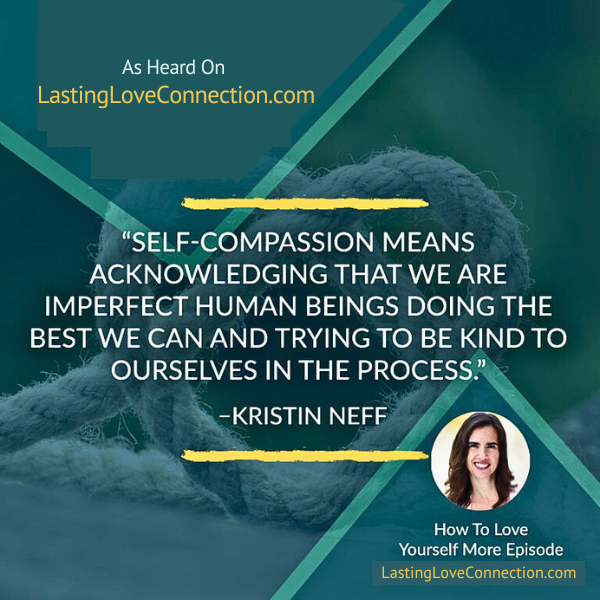
Kamala Chambers
I’d love to hear what you recommend to start the process of integrating more self-compassion into our daily lives and learning how to love ourselves more.
Kristin Neff
Luckily, most people have some experience being kind and compassionate to others. We know what to say when a friend comes and says, “Oh my God. I’ve just had a horrible day,” or “This happened at work.” We know how to be supportive, give our attention to the person, and be caring toward them.
Self-Compassion and Knowing How To Love Yourself More

Kristin Neff
What self-compassion is just giving ourselves the same attention; believe it or not, we often don’t. We’re so lost in either struggling with the problem or criticizing ourselves. You’re feeling ashamed or trying to fix things, but we just don’t pause to say, “Hmmm. This is a difficult moment I’m going through right now. I actually need a little kindness and support for myself.”
This is really important in knowing how to love yourself more. The first step in practicing self-compassion in your daily life is noticing those moments of suffering and struggle and trying to respond like a good friend.
Luis Congdon
How can you love yourself more? I have talked to many parents. When I talk to them, I hear how they talk to their children; they are very supportive and loving. However, when I talk to them, I hear from them about how they talk to themselves.
One of the things that I’ll advise couples or parents when I’m talking to them, and I hear that they’re being hard on themselves. I try to ask them, “How would you talk to a child if this was you? How would you talk to them if this was a little kid version of you?” Is that what we’re talking about with self-compassion?
Kristin Neff
Exactly.
One of the ways you can give yourself compassion is to soup up simple questions to know how to love yourself more. When I say this to someone I cared about, a close friend or my child that I was compassionate toward but loved unconditionally and sadly, usually the answer is no. I would not treat my friends or the ones I love this way.
It’s just noticing when we’re being unkind to ourselves and trying to have a new conversation. The most basic level of self-compassion is speaking to ourselves in a warm, supportive tone of voice, using encouraging and constructive messages rather than destructive criticism.
You can also do other things to evoke self-compassion and realize how to love yourself more. For instance, you can use gentle, supportive touch, like putting your hand on your heart, arm, or face. Often, this is just as a child responds to physical touch. We mammals have attachment systems designed to respond to warmth and gentle touch.
We can actually give ourselves that touch, which is a very direct way to support ourselves. Our bodies often feel soothed and comforted even if our minds can’t lather. Placing a gentle, tender hand on our bodies is another access point.
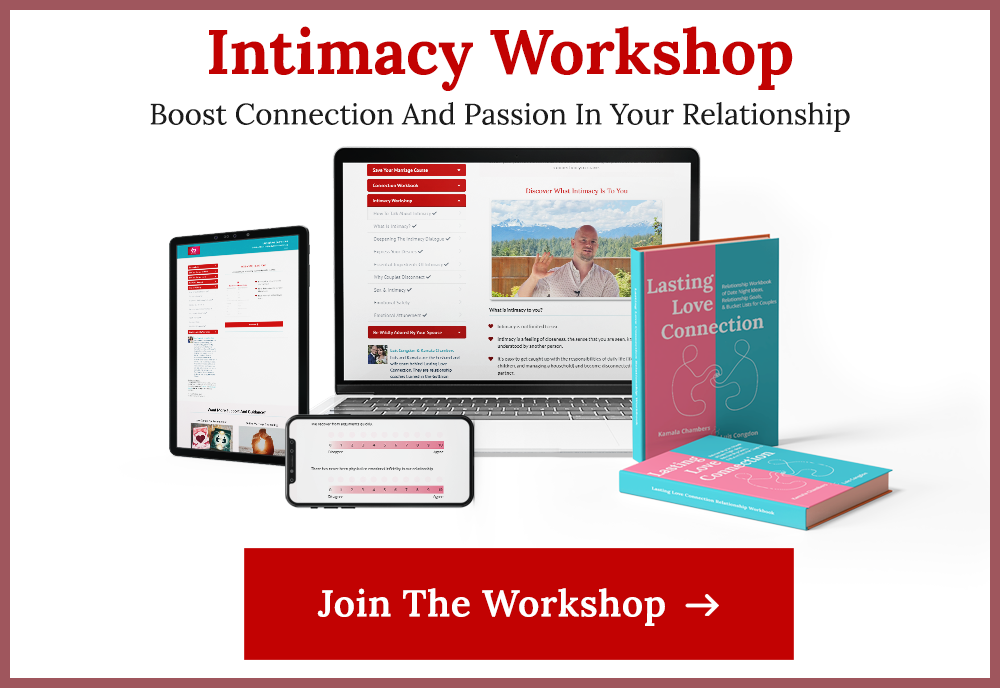
How To Love Yourself More From Within

Kamala Chambers
This is very exciting to have you here, Dale. Welcome! Are you ready to launch?
Kristin Neff
Yes, that’s right. Even if we are lucky enough to have other people in our lives who meet our needs, we need self-compassion to know how to love ourselves more. If we are cruel, cold, or unkind to ourselves, we can’t really take in the love from others, and we’re the only ones who are there for us 24/7, so to speak.
Creating a supportive and encouraging relationship with ourselves makes such a huge difference, and we can teach ourselves how to love ourselves more. I believe it’s really necessary in order to be happy, and the research supports it. It’s not just my belief. There’s a huge empirical literature now showing how important it is to be self-compassionate if we want to have psychological well-being.
Luis Congdon
I want to dive into that a bit because I recall when I first started doing “self-talk.” Self-talk is about talking to yourself and having a compassionate conversation to learn how to love yourself more. Maybe I messed up, and I went, “Man! Luis, you’re such an idiot. You messed up.” Somehow, I’d start saying these things to myself.
When I started reading about self-talk and self-compassion, I understood that I could change that conversation and change the chemistry in my body by changing that conversation. I could change my outlook on my life. I could create more success by changing the dialog that was happening. I wasn’t a victim of it. It was not this automatic thing that there was actually a part of me that had control over that dialog.
At first, I felt really weird, Kristin. It was kind of odd. I would mess up and go, “Oh, it’s okay, Luis. You’re trying. I’m really proud of you for trying, and yeah, sure. You’ve made a little mistake there, but you know what? There’s always tomorrow, and the thing is that you’ve learned something from it, and I’m really excited and proud of you for trying.”
I can see myself saying that to a kid and feeling like, “Wow, this is amazing.” I’m helping coach this child, but doing this with myself was awkward.
Kristin Neff
Yeah, it does feel funny at first. But the interesting thing is that the opposite habitual pattern doesn’t feel funny, does it? I mean, for whatever reason, I think there are reasons based on family of origin and culture. We don’t feel uncomfortable saying, “You loser. I’m ashamed of you. What a good-for-nothing. I can’t believe you said that.”
Treating ourselves like someone we don’t like very much. That comes very naturally. The whole thing is a self-to-self relationship, which is essential for knowing how to love yourself more. It’s just that we’re comfortable and used to being unkind, mean people to ourselves, and we aren’t used to being kind, supportive people to ourselves. It’s really just a matter of choosing how we respond. Choosing are we going to be that kind, compassionate parent? Are we going to be the parent like in the old days? Spare the rotten spoil the child.
Being a Kind and Supportive Person to Ourselves

Luis Congdon
I’m putting myself in the position of when I first got a hold of this information and how revolutionary it can be to have this information to teach how to love yourself more.
Kristin Neff
Yeah, it truly teaches how to love yourself more. It was for me, too. I certainly didn’t invent the idea of self-compassion. I think I’ve helped study it and bring it into the coming culture, but I learned about it in a meditation class I was teaching. It was an amazing moment when I realized I had this resource I didn’t even know existed. It made an immediate difference in my life, and I think a lot of people feel that way.
It’s like, “You’re kidding! I never thought of that before. I can be that warm, caring, supportive, kind, loving friend to myself 24/7, even at 3 in the morning.” This is actually possible, and that’s why it seems to be transforming so many lives.
Kamala Chambers
I am so powerful, and as a business owner, I know that I have been the worst boss to myself. In the past, I would just really get down on myself for not producing enough or not getting things done fast enough. Something I have really struggled with is having self-compassion. I have to say I’m way more productive, and I get so much more done and so much more fun when I have self-compassion and grace for where I am. This way, you can teach yourself how to love yourself more.
What do you say to the people that are overly busy, they have too much to do, too much on their plate? How can this really help them?
Kristin Neff
Sadly, for whatever reason, people honestly believe that if they are kind and supportive of themselves, they will be unmotivated. They really think they need to crack the whips, so to speak, in order to get themselves to do anything that they will be lazy and self-indulgent if they’re kind to themselves.
We know with parenting, for instance, a compassionate parent doesn’t let their child lie around, skip school, eat all the ice cream they want, or not achieve anything. When you care about your child or when you care about your friend, you want the best for them. And so, you try to encourage and motivate them to reach their goals out of love and care, not out of some feeling that they’re inadequate as they are.
The research is clearly the same for us. If we care about ourselves and don’t want to suffer—we want to be happy—then we aren’t going to be lazy and self-indulgent. We’re going to work hard and engage in healthy behaviors. If we do it with an encouraging, motivational, friendly, and constructive mindset, we’re going to be much more able to achieve our goals.
Most people have a very hard time accepting that. I think it’s just the double they know. They haven’t really tried any of the ways to know how to love themselves more.
Luis Congdon
Let’s take a deep dive for a moment and assume everybody in the audience now believes this can work, but I don’t know how to do it. You’ve convinced me that it works. You’ve told me there’s some science, and guys, you can look up the science by going into Kristin’s book on self-compassion.
Let’s just for a moment say we believe all of it and are ready to give it a shot. How do I start? What do I do? Can you lead me through some of that process?
How To Love Yourself More With Self-Help

Kristin Neff
Yeah, it’s so important to know how to love yourself more. Maybe the first easiest step is to see if you can find a supportive touch, a physical gesture of kindness that feels good for you. For many, this may be placing both hands over their heart center. For some people, it’s simply holding one hand in the other, squeezing your fingers. Other people like to use a self-hug, and others might want to gently stroke their face. This is how to love yourself more with self-help.
People are really different, so taking the time to find, “Is there a physical gesture that makes me feel comforted and supported?” is a nice place to start because it will change your body’s biochemistry and nervous system activity, allowing you to feel safer and calmer.
And then, you can follow that up by asking a very simple question, “What would I say to a dear friend I cared about who is going through the same situation I was?” Usually, we know the answer to that. We know what we will say. We ask about the tone of that warm tone of voice we’ve used when we really want to convey to someone that we care and we’re there for them. It’s really just a matter of trying to adapt that language in that warm, supportive tone with themselves.
It definitely feels a little awkward at first, but it’s temporary. You start developing that as a new habit, and before long, this becomes your default option of being kind to yourself as opposed to harshly critical.
Kamala Chambers
I know this practice has been really powerful for me. Even taking a couple of deep breaths has been beneficial for self-compassion because the brain, the body, and all of it function better with breath and oxygen moving through. That’s the simplest and easiest way to consciously practice self-compassion in one breath.
The Two Elements of Self-Compassion
Kristin Neff
Another access point is if you want a fuller definition of self-compassion. I define it not only as being a kind, supportive friend to yourself, but two other elements are key.
- Recognition of common humanity. Remembering that obvious fact that we often forget, which is that everyone is imperfect, makes mistakes, and fails. Often, when we do fail or make mistakes, we irrationally feel like, “I’m the only one who’s done this” or, “It’s just happening to me.”
When we remember that this is actually what is supposed to happen, that we are supposed to fail and make mistakes, that this is what it means to be human, we can really soften the sense of self-focus and isolation we often get, and that can be a pathway to self-compassion.
- Mindfulness. Instead of being lost in our difficult emotions, lost in our suffering, take a moment to step outside of ourselves, take a few breaths, and ask what’s happening right now, “Oh, I see. What’s happening right now is I’m feeling grief” or “I’m feeling anger” or “I’m feeling fear” and that ability to know that we’re suffering when we’re suffering is actually a really important step for them being able to respond with kindness.
Related Reading: Emotional Intelligence
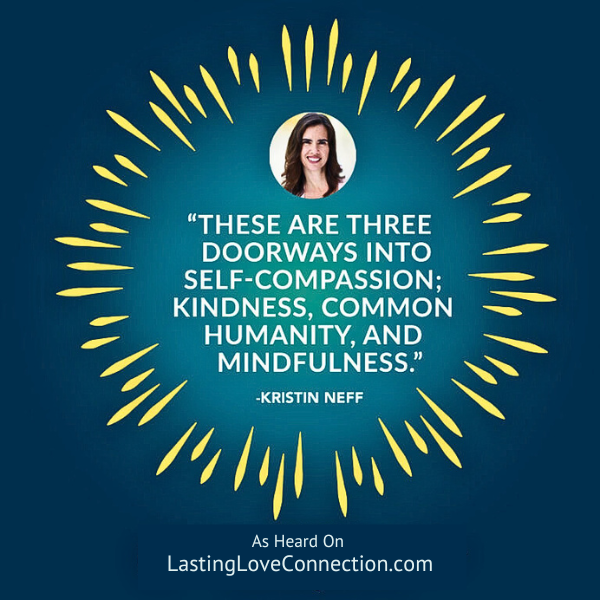
Luis Congdon
I’m thinking about some people and maybe even an element of myself that sometimes gets really wrapped up in making other people happy and how important it is that they’re happy. I’m thinking about how I’m doing this practice. It’s going to probably make me calmer. It’s going to make me feel more loving towards myself. It’s going to make me a gentler person, and that should have an impact on others. Yes?
Kristin Neff
Yes, absolutely it’s essential to know how to love yourself more. It’s so funny, many people are afraid that being self-compassionate means being selfish, not focusing on the needs of others.
First of all, research shows that people are better relationship partners when they’re more self-compassionate. If you are irritated, agitated, down on yourself, and negative, you cannot communicate that to everyone you meet, and they’ll feel that.
They’re going to resonate with you and pick up some of those negative emotions. But if you can be kind, friendly, supportive, and gentle with yourself, then every person you come in contact with will resonate with that and feel better.
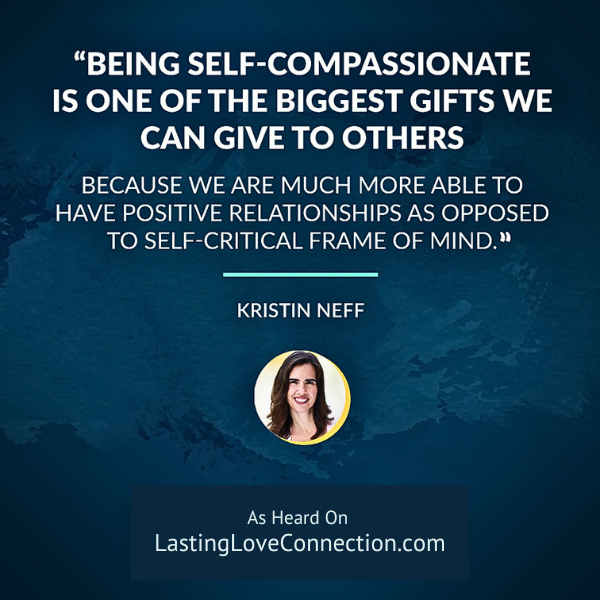
Self-Compassion as a Way Out of Anxiety
Kamala Chambers
I was just thinking about how rampant anxiety is in our culture and something about me I really suffered from for a while due to some traumatic events. I ended up having a series of panic attacks that were very intense, and self-compassion was the way out of that anxiety. It was the most important thing.
A relationship workbook can help.
Luis Congdon
On that note, too, just a big kudos to Kamala because you listen to the show. You’ve been watching Kamala go through her process, and it’s been really cool for me because today, we are having a conversation. And where Kamala and I differ is I’m full of ideas.
I generate a lot of ideas. I’m a very high-energy person. I’m just so much fire, and Kamala is a little bit cooler in her way of being, and she’s more thoughtful and sees steps and processes while I just think of dreams like if I say, “Let’s climb the mountain,” and Kamala starts thinking about the training and the packing that takes to get there.
And today, we are having a conversation and I was like, “We’re going to climb Mt. Everest.” This is like I’m sharing these dreams, and we dialogued for a while, and then Kamala went into her center. She did this very naturally. She just said, “I think I’m tapped out. My energy and my resources are now… I need to take some time just to refuel myself, so let’s stop the dialog here.” I said, “I can think about how we’re going to pack and how we’re going to climb that mountain.”
In fact, when Kamala just kept going with me in the past, she would get exhausted. I would get exhausted. Then, we’d both be upset with each other. Then, we wouldn’t believe the dream anymore, and then we would just spin out and be very mean to ourselves.
Today, Kamala had enough self-compassion and understanding to say, “This is where I’m at. I’m tapped, and now I need to go back.” It was just a really wonderful moment for me.
Kamala Chambers
Yeah. Thank you.
Kristin Neff
That’s beautiful.
Luis Congdon
I mean, these are the kinds of impacts that self-compassion is going to have, yes, Kristin?
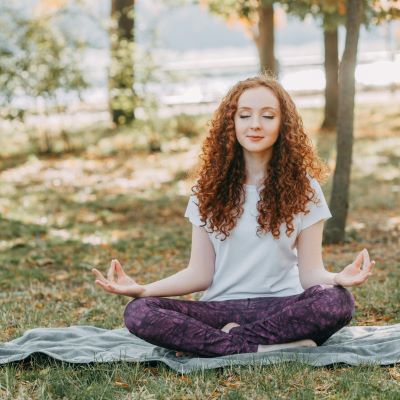
Kristin Neff
Yes.
Also, regarding Kamala’s point about anxiety, one of the biggest benefits of self-compassion is that it actually taps into our safety and soothing system. It’s natural for us as human beings. We’re born into the world. When we are in the presence of a warm, supportive, caring caregiver, we feel safe.
So, actually, one of the things we do when we give ourselves compassion is help us feel safe. We’re letting that part of ourselves know “I’m here for. I got my own back. I’m not going to abandon you.” And that sense of safety is so powerful for counteracting the anxiety we normally feel.
You really felt that one of the key features of self-compassion is that it helps you feel safe.
Luis Congdon
That’s really wonderful.
Kamala Chambers
And that’s something that is really needed for people.
At some point in our growth and fundamental structure, we stop feeling safe. Whether it was someone who was angry and we took it personally that it was about us or something small like that, that memory lives inside all of us, right?
Kristin Neff
That’s right. And we’re so afraid of being rejected for very good reasons. We’re social animals. We need to be loved. We need to feel we belong. But it’s ironic that we try to belong and be loved by others by excluding ourselves, feeling ashamed, being mean, and being hard on ourselves. It’s like we’re pulling the rag out from underneath ourselves.
If we want to be loved and belong, we need to start loving ourselves and telling ourselves, “You belong. I’m here for you. I’m not going to abandon you.”
We really can’t expect it from others if we don’t give it to ourselves.
Luis Congdon
Kristin, the nerd side of me is starting to come, and I’m curious if you could shoot off just a few studies or resources that people can use. We know you have your book, Self-Compassion, but are there any studies or research that people can dive into or other bodies of work? If you can name a few, that’d be awesome.
Kristin Neff
About 900 PDFs of actual published research are on my website, self-compassion.org. If you’re a research nerd, you can read this on my website for the next two weeks. There’s a huge body of literature.
The first one that comes to my head is that people often think that self-compassion is weak. Well, one study showed that soldiers coming back from Iraq and Afghanistan found how self-compassionate soldiers were was more predictive of whether or not they develop PTSD symptoms 9 months later than the level of combat exposure they face. This basic finding is repeated in a number of different domains, with divorce, coping with AIDS, etcetera.
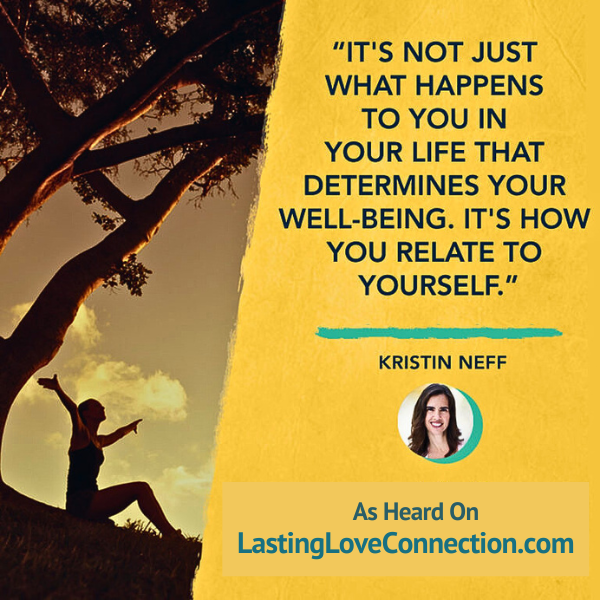
Kristin Neff
Are you an inner enemy, or are you an inner ally? Being an inner ally is strongly linked to strength, coping, resilience, and thriving.
Luis Congdon
That’s fantastic. It sounds like your website has a lot of resources.
The last piece I wanted to touch on is what the self-compassion dialog is when you’re talking to yourself. Because I know that’s an element. We’ve talked about putting your hand on your heart or your thumbs together, taking a breath, or putting your hand on your own knee, whatever it might be as far as touch.
What about the dialog? What does it look like, and can you play that out a little bit for us so we can experience it for a moment?
Kristin Neff
Yeah, okay.
We have something called ” the self-compassion break,” which reminds us of these 3 components of self-compassion to learn how to love ourselves more.
If you’d take a moment and just think about something that you’re struggling with right now in your life, some situation that’s causing some difficulty. Maybe let’s give your listeners a moment to think about one of the situations they’re dealing with in their lives right now. And then, remember these elements of self-compassion.
The first phase of what we call “The self-compassion break” is, “This is a moment of suffering. This is hard.” We’re bringing a mindful awareness to the fact that this situation we’re dealing with is difficult. This is hard for me.” We have to be aware that we’re suffering. That’s the first step to opening our hearts in response.
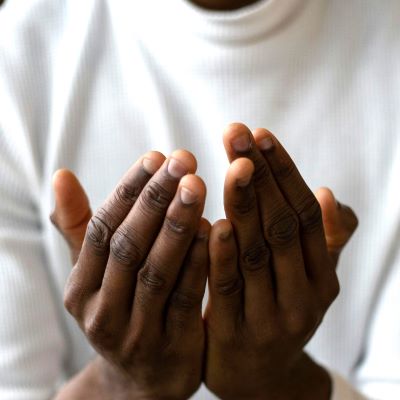
The second phrase is remembering that suffering is a part of life. It’s not that “This shouldn’t be happening,” “Something has gone terribly wrong that it’s happening,” or “It’s just me this is happening to.” These situations, the struggles you’re going through, are part of life. Many people are coping with similar situations, their own flavor and their version of it, but this is part of the shared human experience.
So because of that, it’s really important that we be kind to ourselves. In addition to putting a hand on your heart or some soothing touch, I’m just taking a moment to say some words of kindness. Things you might say to a good friend like, “Gosh, I’m so sorry. This is so hard for you. I really care about you. I’m here for you. What do you need? Can I help you in any way?”
Those words of kindness, encouragement, and support can help us give ourselves what we need and teach us how to love ourselves more.
Those three basic elements are mindfulness, “This is hard. This is suffering,” remembering that this is part of coming humanity, and kindness in response to the difficulty.
That’s really all we need to navigate many of the difficult situations in our lives. It really makes a big difference.
Kamala Chambers
Thank you so much for sharing that and for being here with us all.
You’ve been listening to Kristin Neff. This dialog on self-compassion and how to love yourself more has been so beautiful.
Thank you so much for being here. Keep practicing self-compassion.
Kristin Neff
Thank you both for having me.
Related Episodes
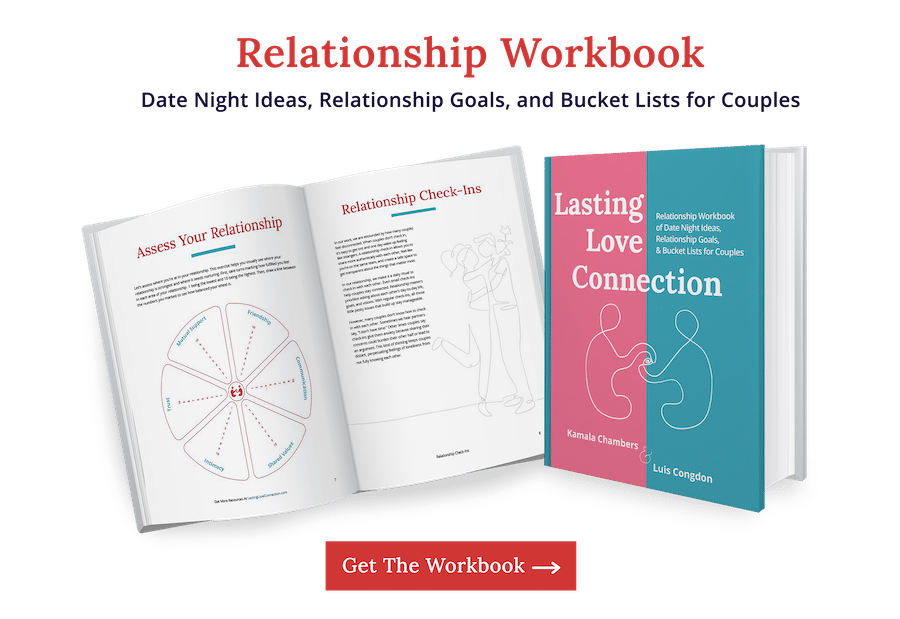






0 Comments